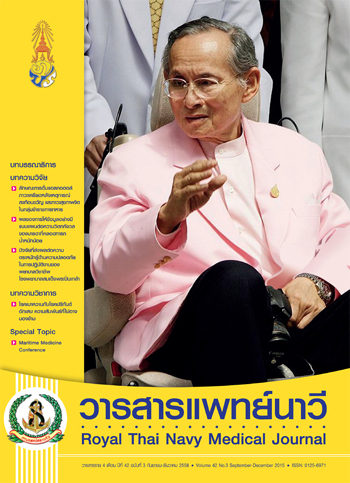ลักษณะการดื่มแอลกอฮอล์ ภาวะเครียดหลังเหตุการณ์สะเทือนขวัญ และภาวะสุขภาพจิตในกลุ่มข้าราชการทหาร
Main Article Content
Abstract
The purposes of this study were to describe alcohol consumption (AC) associated
with post-traumatic stress disorder (PTSD), and other factors associated with alcohol abuse
and mental health problems in the Royal Thai Navy (RTN). A descriptive cross-sectional
study was conducted. An anonymous sample of six hundred and sixty five Royal Thai Navy.
Stratified random sampling was used whereby participants themselves completed five
self-administered questionnaires : 1) Demographic Questionnaire, 2) Alcohol Use Disorder
Identification Test (AUDIT), 3) Posttraumatic Stress Disorder Checklist - Military Version (PCL-M),
4) Thai Mental Health Questionnaire (TMHQ), and 5) Focus Group. The association between
PTSD and associated factors was analyzed by using the Pearson product moment correlation
coefficient and chi-square. Additionally, a t-test, one-way ANOVA were used to examine
data of alcohol consumption. Multiple logistic regression was performed to identify the
potential predictors of alcohol consumption of Royal Thai Navy staff.
The findings based on the AUDIT score, 36.1 % of RTN could be classified as hazardous
drinkers, 14.1% as harmful drinkers and 15.2% as probable alcohol dependents. We
found AC reported to be significantly associated with reported involvement in PTSD (p < .01)
and also associated with the PTSD cluster’s symptoms in terms of re-experiencing (p < .01),
avoidance (p < .01), numbing (p < .01), hyperarousal (p < .01). The RTN with PTSD reported
were rated as having a greater number of harmful and alcohol dependents (19.4% and
40.3%) than were without PTSD (13.6 % and 12.5%). Furthermore, an increase in AC in
response to stressful life events (p<.01), fateful events (p<.01) and the tobacco use (p<.01)
was noted, but no significant association was seen between AC and childhood maltreatment.
Whereas, the RTN who were younger than 25 years included heavy drinkers (more
than an hour per day) who were significantly at risk for alcohol abuse. Additionally, AC was
particularly associated in many psychological aspects, particularly psychotic symptoms
(p<.01) where alcohol dependents were significantly impaired with mental health problems.
Finally, seven factors made independent contributions to the prediction of AC i.e. PTSD
(p<.001); tobacco use (p<.001); length of time for AC (p<.001); age (p<.01); stressful legal
domains (p<.01); stressful family relationship (p<.01); and a history of substance use (p<.05).
These issues must be considered in formulating RTN health policies aimed at reducing
problems related to AC within the RTN environment. Furthermore, the intervention and
treatment for alcohol abuse or alcohol dependents should be focus on this comorbidity, as
well as to help improve the efficacy of RTN alcohol reduction programs.
Article Details

This work is licensed under a Creative Commons Attribution-NonCommercial-NoDerivatives 4.0 International License.


